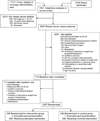Reducing breast cancer recurrence with weight loss, a vanguard trial: the Exercise and Nutrition to Enhance Recovery and Good Health for You (ENERGY) Trial
- PMID: 23266440
- PMCID: PMC3593786
- DOI: 10.1016/j.cct.2012.12.003
Reducing breast cancer recurrence with weight loss, a vanguard trial: the Exercise and Nutrition to Enhance Recovery and Good Health for You (ENERGY) Trial
Abstract
Breast cancer is the most common invasive cancer among women in developed countries. Obesity is a major risk factor for breast cancer recurrence and mortality in both pre- and postmenopausal women. Co-morbid medical conditions are common among breast cancer survivors. The Exercise and Nutrition to Enhance Recovery and Good Health for You (ENERGY) study is a 4-year randomized clinical trial of 693 overweight/obese women aged ≥21years diagnosed with any early stage breast cancer (stages I[≥1cm]-III) within the previous five years, designed to demonstrate the feasibility of achieving sustained weight loss and to examine the impact of weight loss on quality of life and co-morbidities, and to enable future exploration of biochemical mechanisms linking obesity to lower likelihood of disease-free survival. This trial is strategically designed as a vanguard for a fully-powered trial of women who will be evaluated for breast cancer recurrence and disease-free survival. Participants were recruited between 2010 and 2012 at four sites, had completed initial therapies, and had a body mass index between 25 and 45kg/m(2). The intervention featured a group-based cognitive-behavioral weight loss program with telephone counseling and tailored newsletters to support initial weight loss and subsequent maintenance, with the goal of 7% weight loss at two years. This study has high potential to have a major impact on clinical management and outcomes after a breast cancer diagnosis. This trial initiates the effort to establish weight loss support for overweight or obese breast cancer survivors as a new standard of clinical care.
Copyright © 2012 Elsevier Inc. All rights reserved.
Conflict of interest statement
All authors state that they have no actual or potential conflict of interest including any financial, personal or other relationship with other people or organizations within three years of beginning the work submitted that could have inappropriately influenced their work.
Figures
References
-
- AICR/WCRF. Food, Nutrition, Physical Activity, and the Prevention of Cancer: a Global Perspective. London: World Cancer Research Fund; 2007.
-
- American Cancer Society. Cancer Facts & Figures 2012. Atlanta: American Cancer Society;
-
- Ries L, Melbert D, Krapcho M, Stinchcomb D, et al. SEER Cancer Statistics Review 1975–2005. Bethesda, MD: National Cancer Institute; 2008.
-
- Chlebowski RT, Aiello E, McTiernan A. Weight loss in breast cancer patient management. J Clin Oncol. 2002;204:1128–1143. - PubMed
Publication types
MeSH terms
Grants and funding
- P30 DK048520/DK/NIDDK NIH HHS/United States
- R01 CA148791/CA/NCI NIH HHS/United States
- UL1 RR024992/RR/NCRR NIH HHS/United States
- R01 CA081191/CA/NCI NIH HHS/United States
- R21 CA090413/CA/NCI NIH HHS/United States
- CA90413/CA/NCI NIH HHS/United States
- R01 CA106919/CA/NCI NIH HHS/United States
- CA106919/CA/NCI NIH HHS/United States
- CA81191/CA/NCI NIH HHS/United States
- R03 CA101489/CA/NCI NIH HHS/United States
- P30 CA091842/CA/NCI NIH HHS/United States
- CA101489/CA/NCI NIH HHS/United States
- CA148791/CA/NCI NIH HHS/United States
- P30 CA023100/CA/NCI NIH HHS/United States
- CA23100/CA/NCI NIH HHS/United States
- UL1 TR000448/TR/NCATS NIH HHS/United States
LinkOut - more resources
Full Text Sources
Other Literature Sources
Medical



